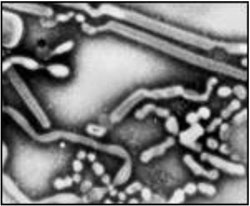Jan 29 2007
 Health officials in Japan confirm that chickens on a farm in Okayama have died from a strain of bird flu; around 40 birds are thought to have succumbed to the virus which has not as yet been determined to be the deadly H5N1 strain.
Health officials in Japan confirm that chickens on a farm in Okayama have died from a strain of bird flu; around 40 birds are thought to have succumbed to the virus which has not as yet been determined to be the deadly H5N1 strain.
As many as 1,200 other poultry on the farm in Takahashi now face the possibility of being culled should tests indicate the presence of the lethal H5N1 strain.
The farm and surrounding buildings have been disinfected and the soil around the farm limed to prevent any further spread of the virus; restrictions have also been imposed on the movement of people and goods.
This is the third outbreak of bird flu to occur in Japan this year; the two other outbreaks which surfaced earlier this month in the southern area of Miyazaki have already been confirmed as the H5N1 strain of the disease.
Japanese authorities say the new outbreak is again a strain of the virulent H5 virus, but further tests at the National Institute of Animal Health in Tsukuba will be carried out to establish if it is indeed the deadly H5N1 strain.
A task force has been set up to ensure everything possible is being done to prevent the virus spreading and to correctly collect data and and inform people.
Farms within a 10 km radius of the latest outbreak have been banned from transporting chickens and eggs, and thousands of chickens have already been culled in Japan's main chicken-producing region of Miyazaki, following two H5N1 outbreaks in two separate towns there earlier this month.
Japan has experienced a number of H5N1 outbreaks since the onset of 2004, but to date there have been no human deaths from the virus.
Across Asia there is growing concern over the increasing number of countries recently reporting cases in both birds and humans.
The re-emergence of the H5N1 virus in South East Asia in late 2003, has been responsible for more than 150 human deaths around the world and millions of birds have either died or been culled.
Countries are on alert as fears remain that the virus could possibly mutate into a form which could be easily passed from human to human, triggering a pandemic with the potential of killing millions.